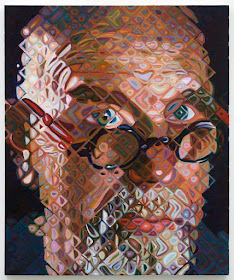by Judy Kronenfeld
My father slipped out of Nazi Germany
in history’s hidden pocket, but the sister
and her family he never talked about stepped
over the crack between everyday
and juggernaut (deportiert 1942, verschollen
in Auschwitz, or für tot erklart
in the same hell).
Briefly paused in Recife
on the way to Ascension Island,
courtesy of the U.S. Army, 1944, my father took in
the faces in gradations of brown,
and said, according to family legend:
“We should all intermarry
until we blend.” As if, to fuse
the blacks and whites, the us
and them tense in his newly beloved
America would move us towards
a gene-pool Esperanto, one flavor, nothing
sticking out, nothing to hoist
a flag, or cross or crescent on.
Even a star.
He dipped his pinky
in the Passover wine to spill the ten drops
for the plagues God visited on the Egyptians,
and with his post-retirement
congregation, bowed to praise
the Creator “who has set us apart.”
But never held himself
apart or wished a plague
on anyone. In his decline, when congregants
visited the dementia wing, he could still mumble
the Hebrew prayers he’d learned by rote
as a kid, though almost everything
in his life—including Paula, Mendel,
Hermann and Charlotte—
was by then verschollen.
But someone is always saying
We’ve fallen from our ancient purity—
take back our country!
Someone like Anders Breivik, self-trained in pure
ruthlessness, whose bomb and bullets
shattered the charm enclosing open Norway.
I remember all of Oslo—like a village—
celebrating light in the dark
of the autumnal equinox,
gathering for the River Walk,
the mud-slick banks of the Akerselva glowing
with candles and torches, spangles flickering
off the silver foil the school kids used
to decorate the trees, all families—adopted African
or Asian children, Muslim mothers
in their sculpted head-scarves—
safe as houses.
And someone else, afraid to disagree,
will wave a torn and faded
flag, so long suppressed,
and holler yes!
Like the proud father who bows
to God when his wife-and-kids-abandoning son
fighting for Islamic State in Syria
is killed, who celebrates that son’s
martyr’s wedding (though the mother says
‘it’s a funeral for me’) in a great tent
draped with black.
It makes me want
all things maculate, muddied
mottled, pocked, all things
tainted,
stained,
blotchy, motley,
mongrel, splotched,
hybrid, scrambled,
half-caste —
If that’s what it takes
to defy Ein Volk, Ein Reich
Ein Führer, the wished-for
Caliphate, Judea and Samaria,
Trump’s Muslim- and Latino-
free America.
Judy Kronenfeld’s most recent books of poetry are Shimmer (WordTech Editions, 2012) and the second edition of Light Lowering in Diminished Sevenths (Antrim House, 2012), winner of the 2007 Litchfield Review Poetry Book Prize. Her fourth full collection, Bird Flying through the Banquet, will be published by FutureCycle Press in the spring of 2017. Her poems have appeared widely in print and online journals including American Poetry Journal, Calyx, Cider Press Review, Cimarron Review, Connotation Press, DMQ Review, Hiram Poetry Review, Innisfree Poetry Journal, Louisville Review, Natural Bridge, The Pedestal, Portland Review, Sequestrum, Spoon River Poetry Review, Stirring, and Valparaiso Review, and in more than twenty anthologies. She is Lecturer Emerita, Dept. of Creative Writing, University of California, Riverside, and Associate Editor of the online journal, Poemeleon.




























